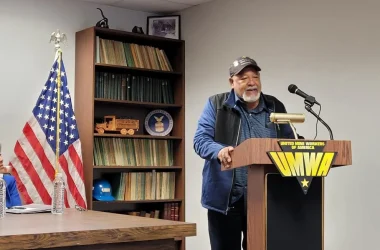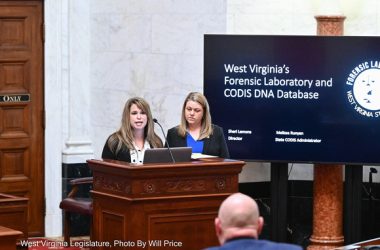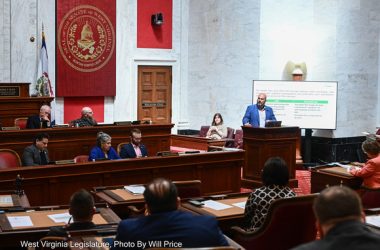WHEELING, W.Va. — Consider these numbers: Since 2009, table gambling receipts have declined 76 percent at Wheeling Island Hotel-Casino-Racetrack, according to the West Virginia Lottery Commission.
Slot machines haven’t fared much better at the Wheeling track, dropping from a high of $2.2 billion put into the machines in 2004 to $1.08 billion in fiscal 2014.
Slot revenue during that time frame dropped from $192 million in 2004 to $83 million last year.
The table gambling decline at Mountaineer Casino-Racetrack-Resort in Chester has been about 60 percent since 2009. And slot revenue? In 2004 it was $259 million; in 2014, it was $149 million.
Both facilities face direct competition from casinos in Pennsylvania and Ohio. And both facilities are suffering.
The West Virginia Lottery Commission is considering a new tool to assist their plight, as lottery Director John Musgrave said last week that his agency is studying online gambling – known as “iGaming” – as a means to help the state’s four racetracks regain some of their marketshare lost to out-of-state casinos.
During a commission meeting in Charleston, Musgrave said that lottery officials had met with West Virginia casino executives to discuss the online gambling measure, which could allow players to gamble legally from their computers, in their homes.
The casinos would operate the websites for such an online gambling venture. Another meeting with casino representatives is set for next month.
Musgrave referred to the meetings with executives as “casino technology summits” designed to bring the “casinos to the table to determine the Lottery’s role in partnering with these facilities to study new gaming platforms.” He said online gambling vendors gave presentations on both social and online-based platforms.
“We believe the response from the casinos was favorable and hopefully provided a better understanding of what this sales channel could do to advance technology solutions and position the state for the future of gaming,” Musgrave said.
Any action with online gambling would require approval from the state Legislature.
Senate President Jeff Kessler, D-Marshall, said he’s not overly familiar with the online gambling proposal.
“It’s not something we’ve explored yet, but I might be open to the suggestion if it contained appropriate security and fraud prevention measures,” Kessler said.
Currently, only three states – Nevada, New Jersey and Delaware – have legalized online gambling. At least 10 other states, including Pennsylvania, are considering such action.
“The West Virginia Lottery has done a very good job of organizing informational meetings between online gaming experts and representatives from the state’s casinos,” said Chris Kern, Mountaineer’s general manager. “The information shared at the meetings will be helpful if and when there comes a time to make decisions.”
Wheeling Island officials did not immediately respond to questions about online gambling.
The plight of West Virginia’s casinos
When table gambling was legalized in West Virginia and passed initially by voters in Ohio and Hancock counties, the industry promised thousands of jobs and tens of millions in new state tax revenue.
That held true for the first few years of gambling operations, until Pennsylvania came online first at The Meadows and, later, at The Rivers Casino. Both those facilities took customers directly from Wheeling Island and Mountaineer. Ohio’s operations in the past two years have continued that trend.
Wheeling Island has seen a significant drop-off in table gambling plays over the past five years. During fiscal year 2009, the casino had $32.1 million in total gross table gambling receipts, with the state’s cut of that amount at $11.25 million in taxes. Last fiscal year, the casino had table gambling receipts of $7.5 million, with taxes paid of $2.6 million. That’s a 76 percent decline in receipts and taxes.
At its peak table gambling year of fiscal 2009, Mountaineer had table gambling receipts of more than $49 million, with taxes to the state that year of $17.2 million. In the last fiscal year, that dropped to $20.3 million in receipts, with $7.1 million paid in taxes.
Kessler said the state always knew the gambling windfall would be temporary, which is why the money was channeled into “building block” programs such as the PROMISE Scholarship, school building funds and seniors.
“Gambling revenue is still an important part of our state budget, but the percentage is going to continue to reduce over the next few years,” he said. “I think it will remain a prominent source of revenue for West Virginia, but it won’t be dominant.
“It used to be that coal and gambling were the most prominent sources of revenue aside from personal income tax. That’s changed and we need to adjust.”
Kessler also noted the state is starting to see a drop in gambling revenue at The Hollywood Casino at Charles Town Races in the Eastern Panhandle, as it faces direct competition from the Horseshoe Casino in Baltimore.
“The monopoly we’ve enjoyed is over,” he added. “I’m not sure (gambling) could ever come back to its previous levels. … They just announced the closing of four casinos in Atlantic City. This is not unique to us.”
Musgrave said outside competition will continue to affect West Virginia’s operations.
“Although table games activity at each facility varies, I would characterize the current state of table games in West Virginia as being susceptible to competition. The racetrack casinos who have higher levels of table games activity coupled with increased rates of new casino properties coming into their markets will likely experience greater impact to that revenue stream,” he said.
“What we can do to bolster revenue is to continue to explore options to both sustain the existing revenue stream, but also look for opportunities to transform our products with the future of the industry. Technological advancements continue to shape our world and gaming is not a component that will be excluded. If we don’t put forth our best effort to provide enhancements to help protect our revenue stream and the good causes lottery proceeds support, someone else will.”
To read more from The Intelligencer/Wheeling News-Register, subscribe here.





